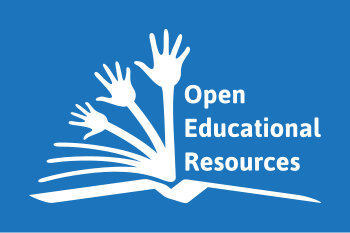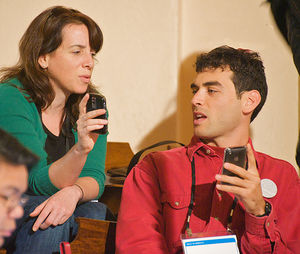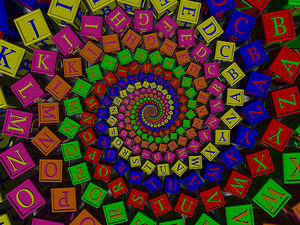Digital learning literacies
Contents
- 1 A course based solely on open educational resources
- 2 Pedagogy of discovery
- 3 Learning Literacies in a Digital Age (LLiDA) “Framework of Frameworks”
- 4 Peer learning support
- 5 More than computer skills
- 6 Sourcing credible information online
- 7 Digital literacy skills for the 21st century
- 8 References
A course based solely on open educational resources
An important feature of this course is that it uses Open Educational Resources (OER) as the content basis for your studies. OER are digital materials that are freely available to educators, students and self/lifelong learners. OER are increasingly being integrated in open and distance education as they are not subjected to the same copyright constraints as other materials. Therefore, they are more accessible and freely available to all students. The second e-learning activity (e-tivity) for this course will invite you to identify two OER resources and assess there relevance for your purposes and exercise a value judgement on their credibility.Pedagogy of discovery
This brings us to another important feature of this course which is the course pedagogy. In OERuOEP, we use the ‘pedagogy of discovery’ (including self-discovery) to engender a free-range learning pedagogy. This pedagogy incorporates self-directed content gathering and analysis rather than content that is pre-selected by the examiner. This approach is deliberate in order to allow you to seek out information and areas of study of personal and direct interest or relevance to your own interests or career path.
For example - perhaps you want to focus on the national copyright laws of New Zealand because you work as an educator in this country. The pedagogy of discovery used in this course will allow you to focus your studies of intellectual property rights on the New Zealand context, or country of your choice, so you can enhance your knowledge and understanding of your own context. The e-learning activities each week are designed to provide the flexibility for you to focus on your own areas of interest within the framework of the course objectives.
The pedagogy of discovery provides greater flexibility to choose countries which are of interest to you, rather than these being prescribed by your lecturer. At this introductory point in the course, which aspects of "open education" would you like to focus on? Share your thoughts with fellow students by posting on
|
The objectives for each Unit, which are linked to and feed directly into the overall course aims, will guide you as to what types of content you should be exploring each week. You will be required to locate appropriate educational sources online and then read them to derive course content relevant to that particular week’s learning objectives. Therefore, the pedagogy of the course involves active bottom-up learning within an explicit top-down learning framework/scaffolding. Ultimately however, you will be the one who decides which Open Educational Resources you will focus on in order to meet the objectives set for any given Module.
Learning Literacies in a Digital Age (LLiDA) “Framework of Frameworks”
The “Framework of Frameworks” is a cornerstone of the pedagogy in OERuOEP. The LLiDA framework is represented in the table below. The Framework demonstrates the component competences you will develop throughout your studies in OERuOEP, all of which are important skills required in the digital age. These competences include metacognition, academic practices and information literacy, communication and collaboration skills, media, ICT, digital and computer literacy, greater participation and engagement with citizenship, and finally, employability.
| |
Component competences |
| Learning to learn, metacognition | Reflection, Strategic planning, Self-evaluation, Self-analysis, Organisation (time, etc.) |
| Academic practice, study skills | Comprehension, Reading/apprehension, Organisation (knowledge), Synthesis, Argumentation, Problem-solving, Research skills, Academic writing, Specific subject discipline skills as appropriate |
| Information literacy | Identification, accession, organisation, evaluation |
| Communication and collaboration skills | Teamwork, Networking, 'Speaking' and 'listening' skills (see below for different media) |
| Media literacy (also 'visual' and 'audio' and 'video' literacies) | Critical 'reading', Creative production |
| ICT/digital/computer literacy | Keyboard skills, Use of capture technologies, Use of analysis tools, Use of presentation tools, General navigation/UI skills, Adaptivity Agility Confidence/exploration |
| Employability | Self-regulation, Team working, Problem solving, Business and customer awareness, Innovation/enterprise |
| Citizenship | Participation and engagement, Ethicality/responsibility, Political, social, personal responsibility |
- (Source: Beetham, Helen, McGill, Lou & Littlejohn, Allison 2009, Thriving in the 21st Century: Learning Literacies for the Digital Age (LliDA project), The Caledonian Academy, Glasgow Caledonian University. Accessed 22 August 2011, http://www.caledonianacademy.net/spaces/LLiDA/uploads/Main/LLiDAreportJune09.pdf.)
Peer learning support
While this all could seem a little daunting for some, please remember you will not be alone on your information seeking journey. You will have clear guidance through the e-learning activities (electronic/online activities) as to what types of information you are looking for each week.The OERu provides a community-based question and answer forum called ask.oeruniversity. Within our international cohort, someone will know the answer to your question, so don't feel shy to ask. If you know the answer to an unanswered question, share your gift of knowledge and earn community kudos. In this course we are simultaneously learners and teachers. Learning and education is about sharing.
More than computer skills
We also need to think about what it means to be digitally literate. In addition to content acquisition on the Open Education Practice course, digital literacy will be an important skills base that you develop throughout your studies in this course. Digital literacy means that you are not only able to locate information using digital technology, but it also means you are able to organise, understand, evaluate and analyse the information. Therefore, digital literacy means more than just being able to use a computer, it goes beyond computer skills and incorporates a number of literacy skills, some of which you already have acquired, and others you will develop over the course of the semester.Sourcing credible information online
There is a great deal of information available on the Internet. Some of it is very credible and useful. However, there is a lot of misinformation and poorly researched information online too. As your studies progress this semester, you need to think about the types of information you find through your search engine and you need to become skilled at identifying information that is credible and useful, and which links are best avoided. The CARS Checklist for Online Source Evaluation (Harris 2010[1]) is an appropriate means of determining what you need to look for when assessing the credibility of the information coming up in your online searches. As you become more skilled at academic online searching and locating materials you will be quicker at determining what information is useful and credible. In the meantime, you should apply this checklist to the information you find.
The CARS Checklist for Online Source Evaluation
| Credibility | Trustworthy source, author’s credentials, evidence of quality control, known or respected authority, organisational support. Goal: an authoritative source, a source that supplies some good evidence that allows you to trust it. |
| Accuracy | Up to date, factual, detailed, exact, comprehensive, audience and purpose reflect intentions of completeness and accuracy. Goal: a source that is correct today (not yesterday), a source that gives the whole truth. |
| Reasonableness | Fair, balanced, objective, reasoned, no conflict of interest, absence of fallacies or slanted tone. Goal: a source that engages the subject thoughtfully and reasonably, concerned with the truth. |
| Support | Listed sources, contact information, available corroboration, claims supported, documentation supplied. Goal: a source that provides convincing evidence for the claims made, a source you can triangulate (find at least two other sources that support it). |
- (Source: Harris, Robert 2010, ‘Evaluating Internet Research Sources’.VirtualSalt. Accessed 17 October 2001
Digital literacy skills for the 21st century
As we progress further into the 21st century it is important to realise that digital literacy is an important skills base we will all need to develop. Jobs, training opportunities and even everyday life increasingly require us to have digital literacy skills. In addition, research and academic endeavours also require us to be adept at these skills – particularly as more and more primary and secondary source material are only available as e-books, online journals or in online databases. Therefore, we need to continue to develop our digital literacy skills and this course will help you to achieve this.
References
- ↑ Harris, Robert 2010, ‘Evaluating Internet Research Sources’. VirtualSalt. Accessed 17 October 2001.


